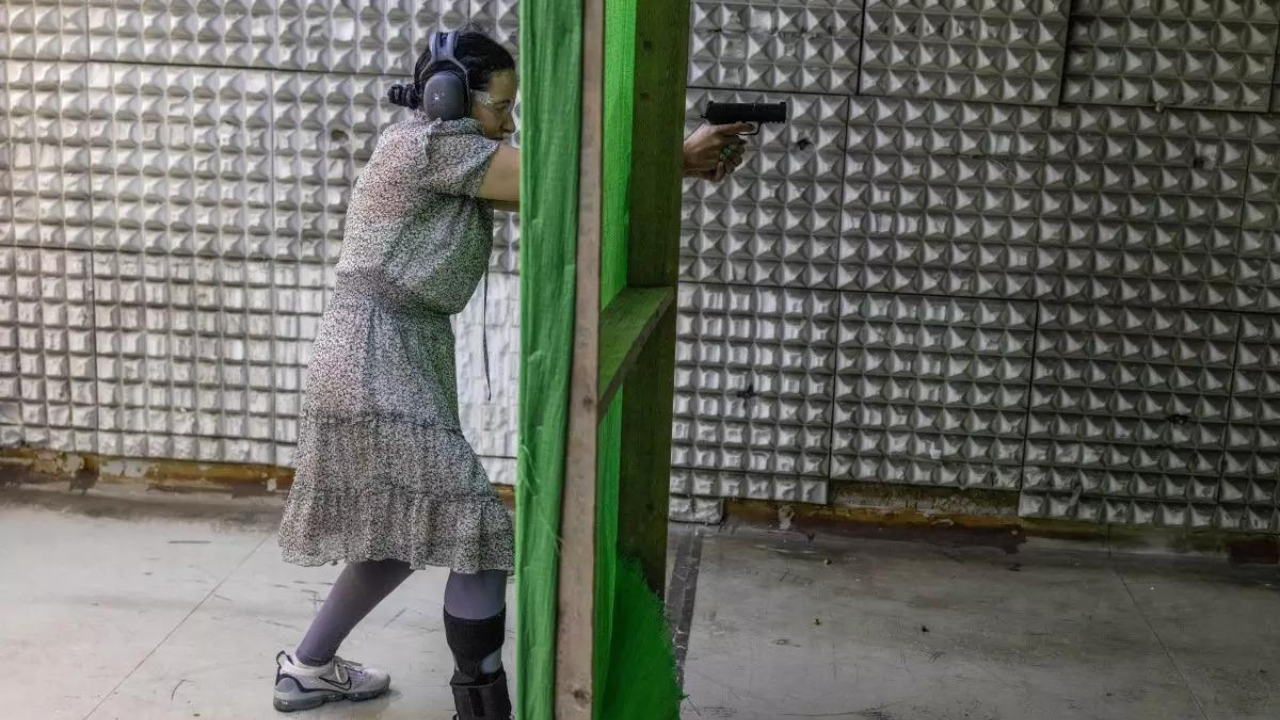[ad_1]
More than 42,000 women have applied for gun permits in Israel following the unprecedented attack by Hamas on October 7, with 18,000 of them being approved. This significant increase in the number of women applying for gun permits has been attributed to a sense of insecurity after the attack by Hamas.
According to data from the security ministry, the number of applications is more than triple the number of pre-war licenses held by women.Feminist groups, however, have criticized this rush to arms.
The surge in gun ownership has been facilitated by the loosening of gun laws under Israel’s right-wing government and its far-right security minister Itamar Ben Gvir. As a result, more than 15,000 women civilians now own a firearm in Israel and the occupied West Bank, with 10,000 enrolled in mandatory training, according to the ministry.
Expressing a change in her perspective, Limor Gonen, a political science professor, told AFP, “I would have never thought of buying a weapon or getting a permit, but since October 7, things changed a little bit.”
Gonen, after attending a mandatory weapons handling class, added, “We were all targeted (on October 7) and I don’t want to be taken by surprise, so I’m trying to defend myself.”
Under Ben Gvir’s leadership, the process for obtaining a gun license has been expedited, with Israeli media reporting that in the immediate aftermath of the Hamas attack, the authorities were often clearing hundreds of permits per day.
The eligibility criteria for gun ownership in Israel now include being a citizen or permanent resident over the age of 18, having a basic command of Hebrew, and medical clearance. However, the full list of requirements makes it nearly impossible for non-Jews to obtain a permit.
Many organisations and activists however, have condemned the policy of easy access, suggesting that this can lead to an increase in murders and violence.
Despite the criticism, some women feel safer with their newfound access to firearms. Yahel Reznik, a 24-year-old community manager, said she now felt “a lot more safe” in Ariel, a West Bank settlement. “Thanks to my training I will be able to defend myself and protect others” from an attack, she told AFP.
The October 7 attack that triggered the war resulted in the deaths of 1,194 people in Israel, mostly civilians, according to Israeli official figures. In response, Israel’s retaliatory offensive has killed at least 37,431 people in Gaza, also mostly civilians, according to the Hamas health ministry.
According to data from the security ministry, the number of applications is more than triple the number of pre-war licenses held by women.Feminist groups, however, have criticized this rush to arms.
The surge in gun ownership has been facilitated by the loosening of gun laws under Israel’s right-wing government and its far-right security minister Itamar Ben Gvir. As a result, more than 15,000 women civilians now own a firearm in Israel and the occupied West Bank, with 10,000 enrolled in mandatory training, according to the ministry.
Expressing a change in her perspective, Limor Gonen, a political science professor, told AFP, “I would have never thought of buying a weapon or getting a permit, but since October 7, things changed a little bit.”
Gonen, after attending a mandatory weapons handling class, added, “We were all targeted (on October 7) and I don’t want to be taken by surprise, so I’m trying to defend myself.”
Under Ben Gvir’s leadership, the process for obtaining a gun license has been expedited, with Israeli media reporting that in the immediate aftermath of the Hamas attack, the authorities were often clearing hundreds of permits per day.
The eligibility criteria for gun ownership in Israel now include being a citizen or permanent resident over the age of 18, having a basic command of Hebrew, and medical clearance. However, the full list of requirements makes it nearly impossible for non-Jews to obtain a permit.
Many organisations and activists however, have condemned the policy of easy access, suggesting that this can lead to an increase in murders and violence.
Despite the criticism, some women feel safer with their newfound access to firearms. Yahel Reznik, a 24-year-old community manager, said she now felt “a lot more safe” in Ariel, a West Bank settlement. “Thanks to my training I will be able to defend myself and protect others” from an attack, she told AFP.
The October 7 attack that triggered the war resulted in the deaths of 1,194 people in Israel, mostly civilians, according to Israeli official figures. In response, Israel’s retaliatory offensive has killed at least 37,431 people in Gaza, also mostly civilians, according to the Hamas health ministry.
[ad_2]
Source link








